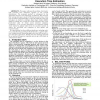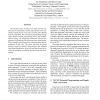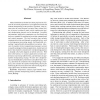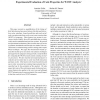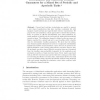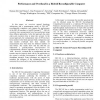125
click to vote
DATE
2010
IEEE
15 years 7 months ago
2010
IEEE
This paper addresses the problem of stochastic task execution time estimation agnostic to the process distributions. The proposed method is orthogonal to the application structure ...
113
click to vote
WORDS
2003
IEEE
15 years 7 months ago
2003
IEEE
The execution time of software for hard real-time systems must be predictable. Further, safe and not overly pessimistic bounds for the worst-case execution time (WCET) must be com...
113
click to vote
SRDS
2003
IEEE
15 years 7 months ago
2003
IEEE
Many mathematical models have been proposed to evaluate the execution performance of an application with and without checkpointing in the presence of failures. They assume that th...
115
click to vote
RTSS
2003
IEEE
15 years 7 months ago
2003
IEEE
This paper presents a quantification of the timing effects that advanced processor features like data and instruction cache, pipelines, branch prediction units and out-oforder ex...
140
click to vote
RTCSA
2003
IEEE
15 years 7 months ago
2003
IEEE
Current hard real-time technologies are unable to support a new class of applications that have real-time constraints but with dynamic request arrivals and unpredictable resource r...
120
click to vote
RTAS
2003
IEEE
15 years 7 months ago
2003
IEEE
This paper investigates how dynamic branch prediction in a microprocessor affects the predictability of execution time for software running on that processor. By means of experim...
131
click to vote
MEMOCODE
2003
IEEE
15 years 7 months ago
2003
IEEE
In this paper, we present a technique for determining tight bounds on the execution time of assembler programs. Thus, our method is independent of the design flow, but takes into...
IPPS
2003
IEEE
15 years 7 months ago
2003
IEEE
In this paper, we overview general hardware architecture and a programming model of SRC-6ETM reconfigurable computers, and compare the performance of the SRC-6E machine vs. Intel�...
120
click to vote
HICSS
2003
IEEE
15 years 7 months ago
2003
IEEE
The discovery of sequential patterns, which extends beyond frequent item-set finding of association rule mining, has become a challenging task due to its complexity. Essentially, ...
CISIS
2010
IEEE
15 years 7 months ago
2010
IEEE
Abstract—Program performance optimisations, feedbackdirected iterative compilation and auto-tuning systems [1] all assume a fixed estimation of execution time given a fixed inp...
